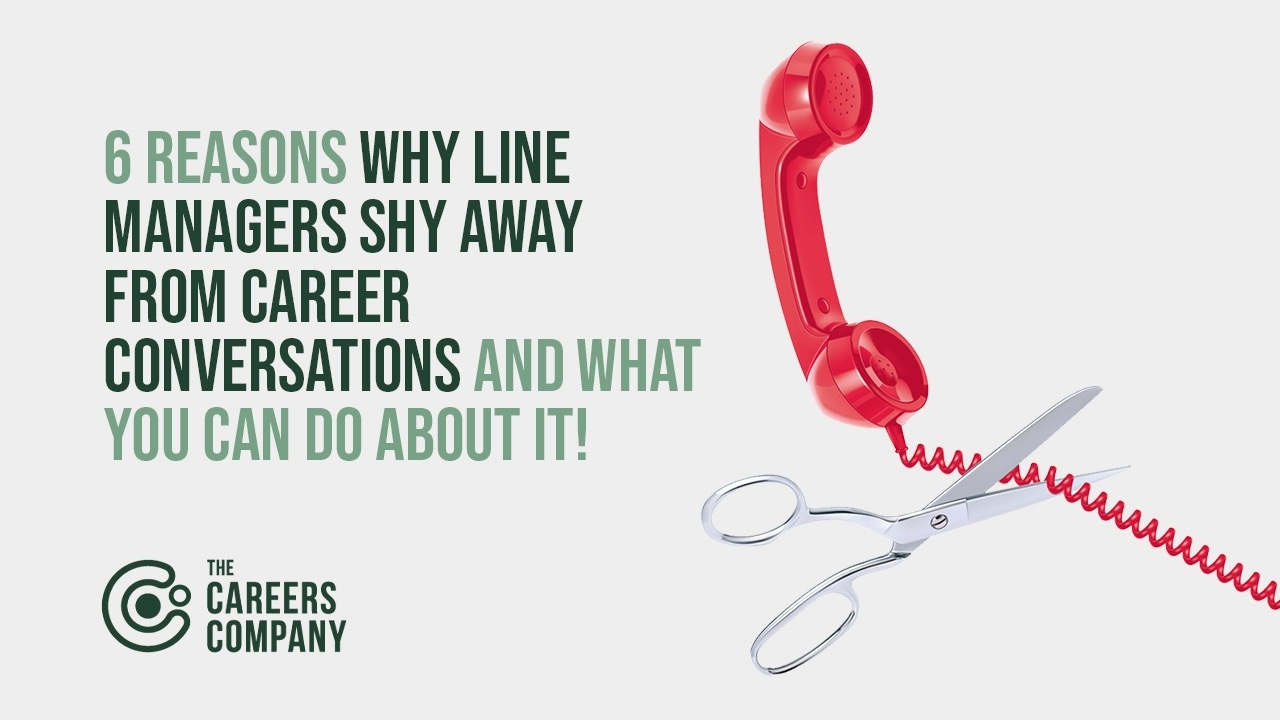
6 reasons why managers shy away from career conversations and what you can do about it!
Nov 28, 2022
Conversation is a crucial part of life and work. We all know a good conversation from experience, and also a bad one! When there is two-way acknowledgement and both parties feel listened to and respected: that’s a good conversation. At The Careers Company we have particular investment and expertise in the world of work, and as such we seek to promote and facilitate good career conversations. The definition of which (adapted from Kidd 2006) is “ongoing dialogue between a coach (or manager/mentor) and an individual, focused on helping the individual make career-related decisions and deal with career-related issues.”[1]
Let’s dissect that a little…
It’s not a “one off” or annual conversation but continual dialogue
- You can have it with a number of different people, not just with your manager (but we are focusing on the manager here)
- It’s solution-focused, based on supporting the resolution of career-related issues (e.g. influencing successfully, creating work-life balance or adjusting to hybrid working) or taking career-related decisions (e.g. transitioning careers or thinking about pre-retirement)
When was the last time you had a conversation about your career? How does your organisation support this? These are important questions, since when done well they present a win-win situation for both employee and employer. An employee is less likely to leave an organisation with which they have regular and good career conversations as they feel supported. Organisations also win as career conversations help, amongst other things, to bring together the aspirations of the organisation with those of the employee.

Despite the all-round benefits career conversations offer both to employees and the organisations they work for, they don’t always happen, and when they do they may not be effective. When we asked our followers on LinkedIn, 65% of respondents said they either had had a career conversation “a few years ago” or “couldn't remember when”. This is a worrying statistic.
Let's look at the 6 common reasons from the research why career conversations don’t happen:
Managers don’t have the time or inclination to do this. With high expectations put on managers they may feel they must prioritise, and career conversations are not seen as a priority
- Managers don’t have the capability to do this. They may not have been adequately trained in how to conduct good career conversations. That includes perhaps not having had it modelled to them
- They don’t want to upset the status quo. However, as stated by Kaye & Winkle Giulioni (2012)[2] “employees have growth on their minds - whether you address it or not”. Ignoring that may be more dangerous to the status quo
- Everyone just wants more! We will lose our strongest talent if we ask them what they want. I’m not confident I can deal with the outcomes of a career conversation, for example if they ask for a promotion
- They have a targeted approach, only focusing on “high potentials”. There may be a wrong view that only certain individuals are worth having career conversations with, however, all employees are worthy of this attention
- There’s a belief that it’s not my job to do this. But it is! To MacArthur (2020)[3], in an ideal world “a manager plays a critical role of career collaborator and it’s their job to do so”
What do we do about this? There needs to be a culture of career conversations in the organisation, with those in charge modelling and encouraging this. It needs to be seen as a priority as good career conversations will produce all round benefits to both employers and employees. Managers must be willing to engage in career conversations, but also be equipped to do so, with appropriate support and training. It must be remembered that although employees have growth on their minds as stated above, this does not necessarily mean they are seeking promotion. When we recently asked our followers on LinkedIn “what does career success mean to you?”, 41% of respondents chose the option “being able to use my skills”. This requires a creative and flexible response to employees’ wishes.

Help is at hand! The Careers Company offers two key services for organisations. Both of the packages described below address the need for organisations to engage, retain and develop talent for the long-term and the key role managers play in this.
Are you as a manager equipped to have the necessary conversations to aid employee happiness and organisational growth? Our career coaching upskilling programmes are designed to build the capability and confidence of managers for higher quality career conversations. See Career Conversations With My Team. Are you meeting the common desire amongst employees for career progression? Remember, this may not necessarily mean promotion, but a stimulating and rewarding career, whatever form that may take. See Employee Career Paths.
Click here to find out more about both packages: https://www.thecareerscompany.com/organisations
[1] *Adapted from Kidd, J. M. (2006). Understanding career counselling: Theory, research and practice. Sage
[2] Kaye, B. and Winkle Giulioni, J (2012) Help Them Grow Or Watch Them Go: Career Conversations Employees Want. Berrett-Koehler Publishers, Inc
[3] MacArthur, H. V. (2020). Career Conversations: How To Approach Them When No One Knows What’s Happening Next? Forbes online
Stay connected with news and updates!
Join our mailing list to receive the latest news and updates from our team.
Don't worry, your information will not be shared.
We hate SPAM. We will never sell your information, for any reason.
